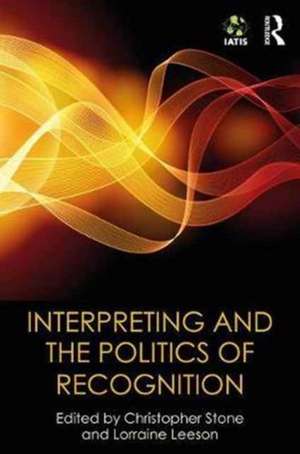Interpreting and the Politics of Recognition: The IATIS Yearbook
Editat de Christopher Stone, Lorraine Leesonen Limba Engleză Hardback – 18 sep 2017
The contributors include leading authorities in their fields and use a wide spread of examples from a variety of disparate cultures – including deaf and ethnic minority groups. With eight chapters presented in three thematic sections and a foreword by Michael Cronin setting the book in its wider context, this volume will be of interest to practising interpreters, researchers and advanced students in the areas of Interpreting Studies, Translation Studies, and Linguistics and Communication Studies.
Additional resources for Translation and Interpreting Studies are available on the Routledge Translation Studies Portal: http://cw.routledge.com/textbooks/translationstudies.
| Toate formatele și edițiile | Preț | Express |
|---|---|---|
| Paperback (1) | 257.68 lei 6-8 săpt. | |
| Taylor & Francis – 18 dec 2020 | 257.68 lei 6-8 săpt. | |
| Hardback (1) | 1001.90 lei 6-8 săpt. | |
| Taylor & Francis – 18 sep 2017 | 1001.90 lei 6-8 săpt. |
Preț: 1001.90 lei
Preț vechi: 1221.83 lei
-18% Nou
Puncte Express: 1503
Preț estimativ în valută:
191.71€ • 200.70$ • 158.63£
191.71€ • 200.70$ • 158.63£
Carte tipărită la comandă
Livrare economică 05-19 aprilie
Preluare comenzi: 021 569.72.76
Specificații
ISBN-13: 9781138666795
ISBN-10: 1138666793
Pagini: 182
Ilustrații: 10
Dimensiuni: 156 x 234 x 18 mm
Greutate: 0.5 kg
Ediția:1
Editura: Taylor & Francis
Colecția Routledge
Seria The IATIS Yearbook
Locul publicării:Oxford, United Kingdom
ISBN-10: 1138666793
Pagini: 182
Ilustrații: 10
Dimensiuni: 156 x 234 x 18 mm
Greutate: 0.5 kg
Ediția:1
Editura: Taylor & Francis
Colecția Routledge
Seria The IATIS Yearbook
Locul publicării:Oxford, United Kingdom
Public țintă
PostgraduateCuprins
Foreword [Michael Cronin]
Part I: Political contexts and colonialism
1. Interpreting and its politics: Interpreters in the early Sino-British contacts in the eighteenth and nineteenth century [Binhua Wang and Fang Tang]
2. Deaf stirrings in Surinam [Beppie van den Bogaerde and Adde Woest]
3. "A President for all of the Irish": Performing Irishness in an interpreted inaugural presidential speech [Lorraine Leeson, Miranda Stewart, Casey Ferrara, Ivy Bostock, Peter Nilsson and Marlon Cooper]
Part II: Politics of ethics and power
4. Interpreter provision, medical training and ethics [Mary Phelan]
5. The application of ethics within situated action [Ilana Rozanes]
6. Consumers, colleagues, and certification: Exploring the politics of interpreting [Jeremy Brunson]
Part III: Politics of practice and representation
7. Variation in perception of the identity of interpreted Deaf lecturers [Stephanie Feyne]
8. Deaf/non-deaf interpreter teams: Canadian insights on the complexity of professional practice [Debra Russell]
Part I: Political contexts and colonialism
1. Interpreting and its politics: Interpreters in the early Sino-British contacts in the eighteenth and nineteenth century [Binhua Wang and Fang Tang]
2. Deaf stirrings in Surinam [Beppie van den Bogaerde and Adde Woest]
3. "A President for all of the Irish": Performing Irishness in an interpreted inaugural presidential speech [Lorraine Leeson, Miranda Stewart, Casey Ferrara, Ivy Bostock, Peter Nilsson and Marlon Cooper]
Part II: Politics of ethics and power
4. Interpreter provision, medical training and ethics [Mary Phelan]
5. The application of ethics within situated action [Ilana Rozanes]
6. Consumers, colleagues, and certification: Exploring the politics of interpreting [Jeremy Brunson]
Part III: Politics of practice and representation
7. Variation in perception of the identity of interpreted Deaf lecturers [Stephanie Feyne]
8. Deaf/non-deaf interpreter teams: Canadian insights on the complexity of professional practice [Debra Russell]
Notă biografică
Christopher Stone is a Senior Lecturer and Co-Course Leader in Deaf Studies and Interpreting at the University of Wolverhampton, UK. His publications include Deaf Interpreters at Work: International Insights (with Robert Adam, Steven Collins and Melanie Metzger [eds.], 2014).
Lorraine Leeson is Professor of Deaf Studies at the Centre for Deaf Studies at Trinity College, Dublin, Ireland. Her publications include Sign Language in Action (with Jemima Napier, 2016), Irish Sign Language (with John I. Saeed, 2012), Working with the Deaf Community (with Myriam Vermeerbergen [eds.], 2012), and Signed Language Interpreting (with Svenja Wurm and Myriam Vermeerbergen [eds.], 2011).
Lorraine Leeson is Professor of Deaf Studies at the Centre for Deaf Studies at Trinity College, Dublin, Ireland. Her publications include Sign Language in Action (with Jemima Napier, 2016), Irish Sign Language (with John I. Saeed, 2012), Working with the Deaf Community (with Myriam Vermeerbergen [eds.], 2012), and Signed Language Interpreting (with Svenja Wurm and Myriam Vermeerbergen [eds.], 2011).
Descriere
Interpreting and the Politics of Recognition investigates the historical, ethical and professional dimensions of, arguably, most widespread form of intercultural communication. Covering key topics from colonialism to representation, ethics and power, it looks at the different linguistic modalities (signed and spoken) used within communities to investigate equality of citizens. This volume will be of interest to practicing interpreters, researchers and advanced students in the areas of Interpreting Studies, Translation Studies, Linguistics and Communication Studies.








